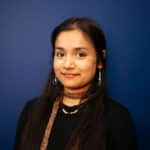Strengthening Indigenous ties: UTM’s first-ever All-Nations Powwow
UTM will be hosting a Powwow to provide space for celebration and reconciliation while also introducing Indigenous knowledge and values to the university community.
On March 25, 2023, the University of Toronto Mississauga (UTM), in partnership with the Mississaugas of the Credit First Nation, will be hosting its first-ever All-Nations Powwow. The event is open to all students and staff, and is a significant step towards the inclusion of diverse cultural celebrations and the deepening of connections with Indigenous community members.
A powwow is an Indigenous social celebration where community members gather and enjoy traditional singing, dancing, and art. The music and dance associated with powwows are traditional hallmarks that come from the Great Plain nations of Canada and the United States. The drumming in the powwow determines the type of dancing that can be performed. However, most powwows are very flexible and open to all dancing styles.
In an interview with The Medium, Tee Duke, director of UTM’s Office of Indigenous Initiatives, explains that powwows and other collective ceremonial celebrations not only create physical spaces to express Indigeneity, but “challenge the notions often embedded in the erasure of Indigenous Peoples, […] and creates space for Indigenous knowledge, language, and land-based learning” to take place. In fact, Duke contends that “reconciliation is a collective responsibility,” as highlighted by the community-based aspects of many Indigenous traditions today.
On par with this sentiment, a collective effort to maintain values of the Truth and Reconciliation Commission of Canada are fundamental to making the broader U of T community feel welcomed and supported. “We volunteer at Indigenous agencies, we sit on Indigenous organization boards, we attend cultural events/activities, and we are robust advocates for our community,” says Duke.
There also several UTM Indigenous Centre initiatives focused on the university community specifically. In addition to the two allocated spaces for Indigenous students and staff on campus—the Tipi outside of the Maanjiwe nendamowinan (MN) building and the Indigenous Centre Gathering Space on the sixth floor of MN—the Indigenous Centre is looking to introduce more initiatives dedicated to place-making, signage, and revitalization of languages.
But why should UTM students and staff attend the All-Nations Powwow, and other similar celebrations? In conversation with The Medium, Professor Ken Derry from the Department of Historical Studies says that there is a lot to learn from the Indigenous way of life, and attending a powwow is an immersive way to gain first-hand exposure to it. “Most Indigenous cultures emphasize the importance of relationships, for instance,” says Professor Derry. “These relationships involve both the human and non-human worlds […] [whereas] colonial societies have typically emphasized individual achievement and gain.” Learning from other cultures can prompt people to ask important questions directly related to their well-being and that of others. For instance, Professor Derry, whose research involves studying Indigenous films and healing, says that one such question may be “What if we spent our energies on relations rather than competition, on ways to support others instead of defeating them?”
Looking prospectively, Duke hopes that “through on-going education and relationship-building with one another that is embedded in reciprocal allyship and ownership of the collective responsibility of the Truth and Reconciliation Commission,” UTM and the greater Canadian community will be a better and more supportive place for all people—Indigenous and non-Indigenous alike.
Students interested in UTM’s Indigenous community can visit the Indigenous Centre website to learn more about upcoming events and opportunities. UTM students and staff can attend the All-Nations Powwow on March 25, 2023, from 12 p.m. to 5 p.m. at the Recreation, Athletics and Wellness Centre. Before attending, however, it is important for students and staff to learn about specific powwow etiquette; more information about this can be found on the Indigenous Centre website.
Opinion Editor (Volume 51); Associate Opinion Editor (Volume 50) — Mashiyat (Mash) is a third-year student studying Neuroscience and Professional Writing and Communication (PWC). As this year’s Opinion Editor, Mash hopes to use her writing, editorial, and leadership skills in supporting student journalism in the essential role it plays in fostering intellectual freedom and artistic expression on campuses. When she’s not writing or slaving away at school, Mash uses her free time cooking cultural dishes, striking up conversations with strangers, and being anxious about her nebulous career plans. You can connect with Mash on her LinkedIn.


